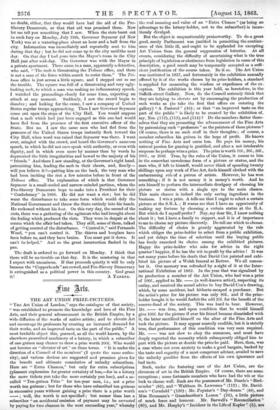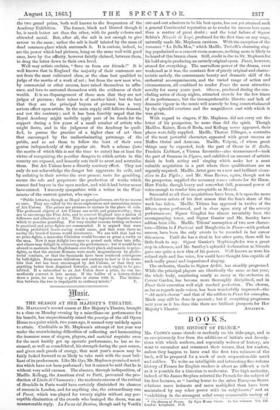in arts.
THE ART UNION PRIZE-PICTURES.
"THE Art Union of London," says the catalogue of that society, "was established to promote the knowledge and love of the Fine Arts, and their general advancement in the British Empire, by a wide diffusion of the works of native artists ; and to elevate Art and encourage its professors by creating an increased demand for their works, and an improved taste on the part of the public." A most laudable object this, pursued, as all the world knows, by the elsewhere proscribed machinery of a lottery, in which a subscriber of one guinea may chance to draw a prize worth 2001. Who would not become an "elevator of art" on these terms. "it is under the direction of a Council of the members" (I quote the same autho- rity), and various devices are suggested and promises given for the benefit and ultimate consolation of unlucky subscribers. Here are "Extra Chances," but only for extra subscriptions (pleasant euphemism for greater certainty of loss,—for in a lottery the more tickets you take the more certainly you lose), and a so- called "Ten-guinea Prize" for ten-year men, i.e., not a prize worth ten guineas ; but for those who have subscribed ten guineas in successive years without gaining a prize there is a prize worth ; well, the worth is not specified ; but sooner than lose a subscriber "an accidental omission of payment may be corrected by paying for two chances in the next succeeding year," whereby
the real meaning and value of an "Extra Chance" (as being an advantage to the lottery-holder, not to the subscriber) is incau- tiously divulged.
But the object is unquestionably praiseworthy. To do a great good, surely Parliament was justified in permitting the continu-
ance of this little ill, and ought to be applauded for excepting Art Unions from the general suppression of lotteries. At all events, considering the difficulty of ascertaining what is the true principle of legislation or abstinence from legislation in cases of this description, a good result may be temporarily accepted as a suffi- cient justification of the course taken. Be it so. The Art Union was instituted in 1837, and fortunately in the exhibition annually offered by it of the works chosen by its prize-holders, a standard is supplied for measuring the wisdom or expedience of the ex- ception. The exhibition is this year held, as heretofore, in the Suffolk-street Gallery. Now, do the Council seriously think that they are helping to elevate art by encouraging the production of such works as (to take the first that offers on entering the gallery) "A Pastoral" (49) ; or that "an improved taste on the part of the public" is likely to be created by the exhibition of, say, Nos. (112), (113), and (114) ? Do the members flatter them- selves that they are promoting the advancement of the Fine Arts by patronizing such " professors " as the painters of these pictures ? Of course, there is no such stuff in their thoughts ; of course, a member subscribes his guinea in the hope of profit. He knows nothing of Fine Arts and cares less. He pays his money, his natural passion for gaming is gratified, and after a not intolerable suspense he perhaps wins a prize. The prize is worth 10/., 20/., 501., 100/., or 2001. True, by the rules of the Union, it comes to him in the somewhat unwelcome form of a picture or statue, and the man who, if left to himself, would never think of spending twenty
shillings upon any work of Fine Art, finds himself clothed with the embarrassing role of a patron of artists. However, he has won
something ; if it is not money it is money's worth. And he sets himself to perform the intermediate drudgery of choosing his picture or statue with a single eye to the main chance.
This main chance is indeed the only saving ingredient in the business. I win a prize. A tells me that I ought to select a certain picture at the S.B.A. ; B warns me that I have an opportunity of making my fortune by choosing a certain statue at the R.A.
But which do I myself prefer? Nay, my dear Sir, I know nothing about it ; but I have a family to support, and it is of importance to me to choose my picture discreetly. Do tell me which to choose.
The difficulty of choice is greatly aggravated by the rule which obliges the prize-holder to select from a public exhibition, and yet delays the time of selection until the buying public has freely exercised its choice among the exhibited pictures.
Happy the prize-holder who asks for advice in the right quarter happier, if he has the wit to profit by the advice It was not many years before his death that David Cox painted and exhi- bited his picture of a Welsh funeral at Bettws. We all remem- ber it. Our memory was refreshed by a sight of it at the Inter- national Exhibition of 1862. In the year that was signalized by its production a member of the Art Union, who had won a prize of 100/., applied to Mr. — (a well-known artist), respecting its outlay, and received the sound advice to buy David Cox's drawing, which, by some accident, had hitherto escaped a purchaser. But the artist's price for his picture was only 801., and if the prize- holder bought it he would forfeit the odd 20/. for the benefit of the reserve-fund of the society. This was hard to bear. However, Mr. — was firm, and upon condition that he would himself give 100/. for the picture if ever his friend became dissatisfied with it, the latter sacrificed himself on the altar of the Fine Arts and took the picture. It may appear scarcely credible, but it is strictly true, that performance of this condition was very soon required. Mr. — was not slow to obey the summons, and must have deeply regretted the necessity which subsequently obliged him to
part with the picture at double the price he paid. Here, then, was a case where not even anxiety to make a good bargain, backed by
the taste and sagacity of a most competent adviser, availed to save the unlucky gambler from the effects of his own ignorance and bad taste.
Such, under the fostering care of the Art Union, are the elevators of art in the British Empire. Of course, there are some exceptions ; some fortunate members who have had the wit or the
luck to choose well. Such are the possessors of Mr. Dearle's "Bird- minder" (82), and "Waltham St. Lawrence" (112) ; Mr. David-
son's " Cornfield " (120) ; Mr. Poynter's " Day-dream" (40), and Miss Neumann's "Grandmother's Lesson" (24), a little picture of much force and humour. Mr. Barwell's " Reconciliation " (60), and Mr. Heaphy's "Incident in the Life of Kepler" (5), are the two grand prizes, both well known to the frequenters of the Academy Exhibition. The former, black and blurred though it be, is much better art than the other, with its gaudy colours and obtruded moral. But, after all, the salt is not enough to give savour to the mass ; rather the salt is itself tainted by the mass of dead common-place which surrounds it. It is curious, indeed, to see the power which bad pictures, hung on the same wall with good ones, have by the affinity, however faintly claimed, between them, to drag the latter down to their own level.
Well may artists exclaim, "Save us from our friends !" It is well known that in England the majority of their customers are not from the most cultivated class, or the class best qualified to judge of the merits of a work of art ; but from the new men who, by commercial or other success, have raised themselves to afflu- ence, and love to surround themselves with the evidences of their wealth. It is no disparagement of these men that they are not judges of pictures ; their talent is of another kind ; but the fact that they are the principal buyers of pictures has a very serious effect upon artists. In the main supply still follows demand, and not the contrary ; and it has been forcibly urged that the Royal Academy might usefully apply part of its funds for the support during a few years of a small number of artists who might desire, and in the judgment of the Academy be quali- fied, to pursue the practice of a higher class of art than that encouraged by the undiscriminating patronage of the public, and so set them to follow the bent of their own genius independently of the popular air. Such a scheme (into the merits of which this is not the time to enter) has at least the virtue of recognizing the peculiar dangers to which artists in this country are exposed, and honestly sets itself to avert and neutralize them. But Art Unions have a directly contrary effect. They not only do not acknowledge the danger but aggravate its evils, and by enlisting in their service the ever present taste for gambling, secure the sale and perpetuate the production of works which cannot find buyers in the open market, and which had better never have existed. I sincerely sympathize with a writer in the West- minster of the current quarter, who says :- "Public lotteries, though as illegal as gaming-houses, are by no moans so rare. They are called by the more euphonious and unmeaning names of Art Unions. The prizes are pictures or statues in the place of coin. The professed objects of Art Unions are noble and praiseworthy ; they are to encourage the Fine Arts, and to convert England into a nation of followers and admirers of Art. This is a most ingenious disguise under which to practise gambling. For very similar reasons betting on horses is practised and prize-fights are commended. It is argued that were betting prohibited horse-racing would cease, and that were there no racing the breed of horses would deteriorate. We are told that had we no prize-fights, a muscular Christian would become as great a rarity as the moa. Now it may delight two men to pound each other into jelly, and others may delight in witnessing the performance ; but it would be as absurd to maintain that Englishmen owe their pluck and muscle to prize- fights, as that the ancient Romans were made magnanimous by ghtdia- torial combats, or that the Spaniards have been rendered courageous by bull-fights. Even more ridiculous and contrary to fact is it to main- tain that Art has been encouraged by Art Unions' or that they are anything better than disguised lotteries, and as such ought to be pro- hibited. If a subscriber to an Art Union draw a prize, he can im- mediately convert it into money. If the holder of a lottery-ticket draw a prize, he can buy a picture or statue with it. The distinc-
tion between the two is impalpable to ordinary minds." V.































 Previous page
Previous page